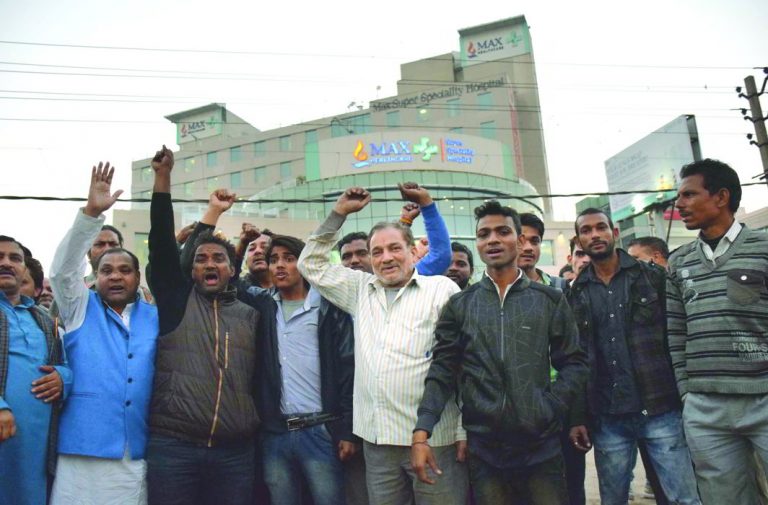
Above: Relatives of a newborn who was wrongly declared dead raise slogans against Max Hospital authorities
The cancellation of the licence of Max Hospital goes against the Delhi Nursing Homes Registration Act, 1953, as one month’s notice has to be given to the hospital before this action can be taken

~By KK Aggarwal
When Max Hospital, Shalimar Bagh, lost its licence recently for negligence by declaring a living baby dead, many problems cropped up. First, how can an entire hospital catering to many seriously ill patients just be shut down without notice? Even if the government wanted to shut it down, it could have shut down one department, not the whole hospital.
Is this shutting down correct in terms of law? The said cancellation order, dated December 8, 2017, passed by the Directorate General of Health Services (DGHS), Government of Delhi, is illegal and against the principles of natural justice. The order was passed under the Delhi Nursing Homes Registration Act, 1953, and said the inspection of Max Super Specialty Hospital, Shalimar Bagh, took place on November 20, 2017, and after the inspection, a show-cause notice was issued to it on November 22.
SECTION 8
As per Section 8 of this Act, before passing any cancellation of registration order, the supervising authority is supposed to give a month’s notice to the nursing home/hospital. The relevant provision of Section 8 says: “(1) Before making an order refusing an application for registration or an order cancelling any registration, the supervising authority shall give to the applicant or to the person registered, as the case may be, not less than one calendar month’s notice of its intention to make such an order, and every such notice shall state the grounds on which the supervising authority intends to make the order and shall contain an intimation that if within a calendar month after the receipt of the notice the applicant or person registered informs the authority in writing that he desires so to do, the supervising authority shall, before making the order, give him (in person or by a representative) an opportunity of showing cause why the order should not be made.”
However, in the present case, the supervising authority, i.e., DGHS, Delhi, did not give one month’s notice to Max and had, in fact, passed the cancellation order in 16 days’ time. Thus, the cancellation order is against the provisions of Section 8 of the Delhi Nursing Homes Registration Act, 1953. Also, the order is against the principles of natural justice as it has not given an opportunity to the hospital to be heard. Further, the grounds under which registration can be cancelled are provided in Section 7 of the Delhi Nursing Homes Registration Act. It says: “Subject to the provisions of this Act, the supervising authority may at any time cancel the registration of a person in respect of any nursing home on any ground which would entitle it to refuse an application for the registration of that person in respect of that home, or on the ground that the person has been convicted of an offence under this Act or that any other person has been convicted of such an offence in respect of that home.”
SECTION 5
Section 5 of the Act says: “(1) Subject to the provisions of this Act and the rules the supervising authority shall, on the receipt of an application for registration, register the applicant in respect of the nursing home named in the application and issue to him a certificate of registration in the prescribed form:
Provided that the supervising authority may refuse to register in the applicant if it is satisfied:
(a) that the applicant, or any person employed by him at the nursing home, is not a fit person to carry on or to be employed at a nursing home of such a description as the nursing home named in the application; or
(b) that the nursing home is not under the supervision of a person who is a qualified medical practitioner and he or a qualified nurse is not resident in the home, or that there is not a proper proportion of qualified nurses among the persons having the superintendence of or employed in the nursing of the patients in the home; or,
(c) that in the case of a maternity home it has not got on its staff a qualified midwife and a qualified medical practitioner; and
(d) that for reasons connected with the situation, construction, accommodation, staff or equipment, the nursing home or any premises used in connection therewith is or are not fit to be used for a nursing home of such a description as the nursing home mentioned in the application or that the nursing home, or premises is or are used or to be used for purposes which are in any way improper or undesirable in the case of such nursing home.”
NOT VALID
Thus, as per the provisions of Section 7 read with Section 5 of the Delhi Nursing Homes Registration Act, medical negligence is not a ground on which registration can be cancelled.
In the present case, medical negligence was made a ground for cancellation of the registration of Max Hospital, which is illegal. Also, medical negligence investigations are on by the Delhi Medical Council which is yet to finish them. A person is innocent till proven guilty.
The other two provisions under which Max’s licence was cancelled include not fulfilling the requirement of EWS patients (from the economically weaker sections of society) and extra dengue beds being used for non-dengue patients. These were other deficiencies.
As the cancellation order is illegal, it is liable to be set aside. The hospital should file an immediate appeal against the order before the Chief Commissioner of Delhi (L-G) and get it quashed.
—The author is president, Indian Medial Association

